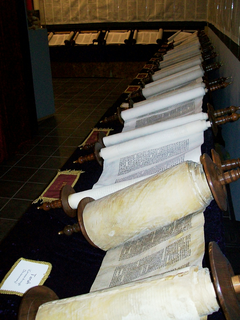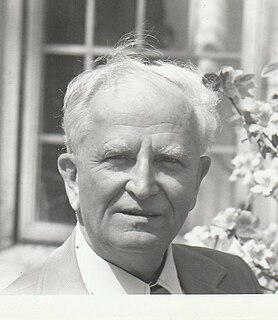
Apocrypha are works, usually written, of unknown authorship or of doubtful origin. Biblical apocrypha is a set of texts included in the Latin Vulgate and Septuagint but not in the Hebrew Bible. While Catholic tradition considers some of these texts to be deuterocanonical, Protestants consider them apocryphal. Thus, Protestant bibles do not include the books within the Old Testament but have often included them in a separate section, usually called the Apocrypha. Other non-canonical apocryphal texts are generally called pseudepigrapha, a term that means "false attribution".

The Hebrew Bible, also called the Tanakh or Mikra, is the canonical collection of Jewish texts, which is also the textual source for the Christian Old Testament. These texts are composed mainly in Biblical Hebrew, with some passages in Biblical Aramaic. The form of this text that is authoritative for Rabbinic Judaism is known as the Masoretic Text (MT), and is divided into 24 books, while the Protestant Bible translations divide the same material into 39 books.

The four tables give the most commonly accepted dates or ranges of dates for the Old Testament/Hebrew Bible, the Deuterocanonical books and the New Testament, including, where possible, hypotheses about their formation-history.

Biblical inerrancy is the belief that the Bible "is without error or fault in all its teaching"; or, at least, that "Scripture in the original manuscripts does not affirm anything that is contrary to fact". Some equate inerrancy with biblical infallibility; others do not. The belief is of particular significance within parts of evangelicalism, where it is formulated in the "Chicago Statement on Biblical Inerrancy".

The New Revised Standard Version (NRSV) is an English translation of the Bible published in 1989 by National Council of Churches. It is a revision of the Revised Standard Version, which was itself an update of the American Standard Version. The NRSV was intended as a translation to serve devotional, liturgical and scholarly needs of the broadest possible range of religious adherents. The full translation includes the books of the standard Protestant canon as well as the Deuterocanonical books traditionally included in the canons of Roman Catholicism and Eastern Orthodox Christianity.

Biblical criticism is an umbrella term for those methods of studying the Bible that embrace two distinctive perspectives: the concern to avoid dogma and bias by applying a non-sectarian, reason-based judgment, and the reconstruction of history according to contemporary understanding. Biblical criticism uses the grammar, structure, development, and relationship of language to identify such characteristics as the Bible's literary structure, its genre, its context, meaning, authorship, and origins.
Raymond Edward Brown was an American Catholic priest, a member of the Sulpician Fathers and a prominent biblical scholar. He was regarded as a specialist concerning the hypothetical "Johannine community", which he speculated contributed to the authorship of the Gospel of John, and he also wrote influential studies on the birth and death of Jesus. Brown was professor emeritus at Union Theological Seminary (UTS) in New York where he taught for 29 years. He was the first Catholic professor to gain tenure there, where he earned a reputation as a superior lecturer.
Because scholars have tended to use the term in different ways, biblical theology has been notoriously difficult to define.
Walter Brueggemann is an American Protestant Old Testament scholar and theologian who is widely considered one of the most influential Old Testament scholars of the last several decades. He is an important figure in modern progressive Christianity whose work often focuses on the Hebrew prophetic tradition and sociopolitical imagination of the Church. He argues that the Church must provide a counter-narrative to the dominant forces of consumerism, militarism, and nationalism.

Biblical literalism or biblicism is a term used differently by different authors concerning biblical interpretation. It can equate to the dictionary definition of literalism: "adherence to the exact letter or the literal sense", where literal means "in accordance with, involving, or being the primary or strict meaning of the word or words; not figurative or metaphorical".
Bruce K. Waltke is an American Reformed evangelical professor of Old Testament and Hebrew. He has held professorships in the Old Testament at Dallas Theological Seminary, Regent College in Vancouver, British Columbia, Westminster Theological Seminary in Philadelphia, Pennsylvania, Reformed Theological Seminary in Orlando, Florida, and Knox Theological Seminary in Ft. Lauderdale, Florida.
Peter Eric Enns is an American Biblical scholar and theologian. He has written widely on hermeneutics, the relationship between religion and science, the creation–evolution controversy, and Old Testament interpretation. Outside of his academic work Enns is a contributor to HuffPost and Patheos. He has also worked with Francis Collins' The BioLogos Foundation. His book Inspiration and Incarnation challenged conservative/mainstream Evangelical methods of biblical interpretation. His book The Evolution of Adam questions the belief that Adam was a historical figure. He also wrote The Bible Tells Me So: Why Defending Scripture Has Made Us Unable to Read It and The Sin of Certainty: Why God Desires Our Trust More than Our 'Correct' Beliefs.
Tremper Longman III is an Old Testament scholar, theologian, professor and author of several books, including 2009 ECPA Christian Book Award winner Dictionary of the Old Testament: Wisdom, Poetry & Writings.
Gregory K. Beale is a biblical scholar, currently a Professor of New Testament and Biblical Theology at Westminster Theological Seminary. He is an ordained minister in the Orthodox Presbyterian Church. He has made a number of contributions to conservative Biblical hermeneutics, particularly in the area of the use of the Old Testament in the New Testament. He served as the president of the Evangelical Theological Society in 2004. In 2013, he was elected by Westminster Theological Seminary to be the first occupant of the J. Gresham Machen Chair of New Testament. At his inauguration he delivered an address titled The Cognitive Peripheral Vision of Biblical Writers.
Loren T. Stuckenbruck is an historian of early Christianity and Second Temple Judaism, currently professor of New Testament at the University of Munich, in Germany. His work has exerted a significant impact on the field.
Mark Allan Powell is the Robert and Phyllis Leatherman Professor of New Testament at Trinity Lutheran Seminary. He is editor of the HarperCollins Bible Dictionary and author of more than 100 articles and 25 books on the Bible and religion, including a widely used textbook, Introducing the New Testament.
Kathleen M. O'Connor is an American Old Testament scholar and the William Marcellus McPheeters Professor Emerita of Old Testament at Columbia Theological Seminary. She is widely known for her work in relating trauma and disaster, as well as present-day intercultural and ecumenical issues for biblical studies.

Samuel Lucien Terrien was a French-American Protestant theologian and biblical scholar. A professor at Union Theological Seminary for thirty-six years, he is known for his biblical commentary, particularly for his scholarly contributions to the study of Job and the Psalms in the Old Testament and for his book, The Elusive Presence (1978), in which he presented a new theology of the presence and absence of God written largely in the context of cult, not covenant. It incorporated both Old and New Testaments in a broader ecumenical context and introduced a way for future theologians to ask how the presence of God is experienced by engaging the wisdom traditions to explore how ‘empirical observation can testify to a divine presence in human life just as visionary experiences can.'










